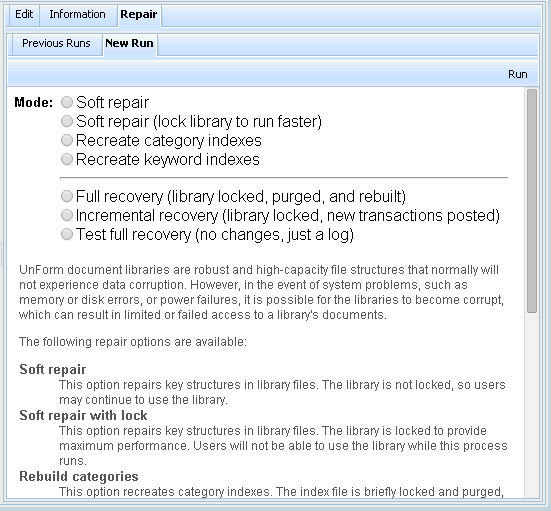Libraries can occasionally encounter corruption, due to unexpected problems such as power or hardware failures, or disk space exhaustion. If you notice that a library displays corruption, typically noticed as unexpected error messages when running an archiving print job or in the browser interface, you can use the Repair tab to run one of several options against the library.
Repair options always run in background, and you can view the log of a previous run in the sub-tab "Previous Runs". To start a new repair job, use the New Run tab and select the desired repair mode.

Soft repair
This option repairs key structures in library files. The library is not locked, so users may continue to use the library.
Soft repair with lock
This option repairs key structures in library files. The library is locked to provide maximum performance. Users will not be able to use the library while this process runs.
Rebuild categories
This option recreates category indexes. The index file is briefly locked and purged, then reconstructed. After the initial purge, users may again use the library, but category indexes will not be fully available until the process is complete.
Rebuild keywords
This option recreates keyword indexes. The index file is briefly locked and purged, then reconstructed. After the initial purge, users may again use the library, but keyword indexes will not be fully available until the process is complete.
Full recovery
This option rebuilds the library from transactions in the library's recovery folder. The library is locked, fully purged, and reconstructed. Users will not be able to use the library while this process runs.
Incremental recovery
This option updates the library from transactions in the library's recovery folder. The library is not purged, and only new transactions are added. This option is normally used for replication purposes of a read-only library. The library is not locked during this process.
Test recovery
This option tests the recovery files in the library's recovery folder. It reads all recovery transaction records and produces a log, but does not perform any updates to the library. The library is not locked during this process.
Note that regardless of these library utilities, you should always maintain good backups of your libraries, to provide recovery in the case of catastrophic disk or system failure.